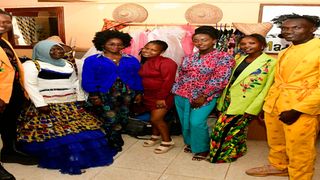
From left: David Ochieng (Avido), Asha Abdul, Grace Murugi, Mercy Ainga, Jackline Mijide, Faith Njeru and Moses Oketch.
| Francis Nderitu | Nation Media GroupLifestyle
Premium
Models with disabilities find spot on fashion runways
Disability can hold back the dreams of many who want to join the world of fashion, but it was not a deterrent to Grace Murugi and Moses Oketch.
Grace, 22, is partially blind, while Moses has a hearing disability.
We meet the models in Kibera, Nairobi, at a store owned by David Ochieng’, commonly known as Avido, a designer who helps them find runway jobs, where they model his clothes.
“Not being able to see made me cautious of how I look. From primary school, I would religiously follow fashion trends to know what people are wearing,’’ says Grace.

Grace Murugi poses for a photo at the Looks Like Avido studio located in Kibera Slums on October 11, 2023.
She started modeling in 2019 while at Kenyatta University studying Human Resource Management.
“There was a Mr and Miss Kenyatta University Disability modelling show. I had heard people say that models were required to be of a certain height and have a 24cm waist. I got discouraged from joining because my waistline measured 30cm. My height did not equally match, but I decided to ask and I was told the disability category had no requirements. What mattered was one’s confidence and sense of style,’’ the 22-year-old says.
Grace won the 2019 to 2021 modelling contests.
The next competition was all-inclusive and did have categories for persons living with a disability. But she competed all the same.
“I didn’t win though I felt like I did not have an audience of my category [people rooting for those living with disability],” she says.
Through the Action Foundation, Grace met David Ochieng’, commonly known as Avido. By then, her interest in becoming a professional model had been piqued.
“The day I met Avido I felt like I had a breakthrough. I had lost hope on my modelling journey and had even stopped trying because there seemed to be no opportunities for us. It was hard fitting in with the non-categorised competitors,’’ she says.
Avido is a fashion designer, born and raised in Nairobi’s Kibera. He wanted to be an engineer when growing up but dropped out of school when he was 11 years old.
“I was raised by a single mother, being a firstborn in a family of four children, my mother could not afford to pay for my school fees,’’ he says at his shop where he designs and stitches clothes.
His interest in fashion started with him seeking to escape idleness.
“Most of my friends were engaged in crime with many being murdered or arrested. I wanted a better life. I started sketching clothes for a dance group I was in and slowly became popular as a designer,” he says.
“I remember attending a concert of the famous reggae artist Don Carlos and he spotted me. He complimented the shirt I was wearing. I had made the shirt. That was more than enough for me to realise whatever I was doing was good enough,” he says.
Avido started featuring models with disabilities because he says they face difficulties similar to what he faced while growing up. Society gives up on them. Many of them do not have the privilege of going to school.
“I have an opportunity to light up their world. Many people in the community run away from them because it’s hard to communicate, love, mingle and manage them. I started with deaf female models. It was not an easy task but consistency makes it easy,” he says.
To work with the deaf, Avido says, he has had to learn how to build trust as their senses are sharper than normal. Now he has normalised having models with disabilities.
He trains them for six months in modelling and sewing, then helps them get internships or sometimes employment in organisations that partner with Avido.
“I mix all my models, those living with disability and the rest, to show them that they matter in any profession, they are not limited as long as they put their minds to it,’’ he says.
Moses Oketch is one of Avido’s models with impaired hearing.
“Modelling makes me feel amazing, with the teaching we get from Avido, we are shown how to be professional models and I can say I am gaining confidence,” the 25-year-old says through a sign language translator, Mercy Ainga, whose sister is deaf.

Mercy Ainga is one of the models that took part in the event.
Apart from modelling, Moses is also a dancer in a deaf dance group. They travel countrywide to show people that the deaf can dance even though they are not able to hear the sound beats.

Moses Oketch has impaired hearing. He says that modelling has made him more confident.
“Through modelling, I can earn an income to put my children through school and provide food alongside basic needs for my family,” he says, adding that in future he wants to model for renowned brands and show the world that the deaf are not limited, they can be identified for what they do professionally.
Grace was not born with visual impairment. She started losing sight in 2008 due to delayed treatment of an eye problem. When she lost sight, she was forced to go to Thika High School for the Blind where she learned braille.
“I love looking good. I don’t know how people expect us to dress. When people see me in town, they question my ability to walk in high heels, and many think I am pretending that I have a disability. Sometimes I have to give out my PWD identification card for them to believe.”




